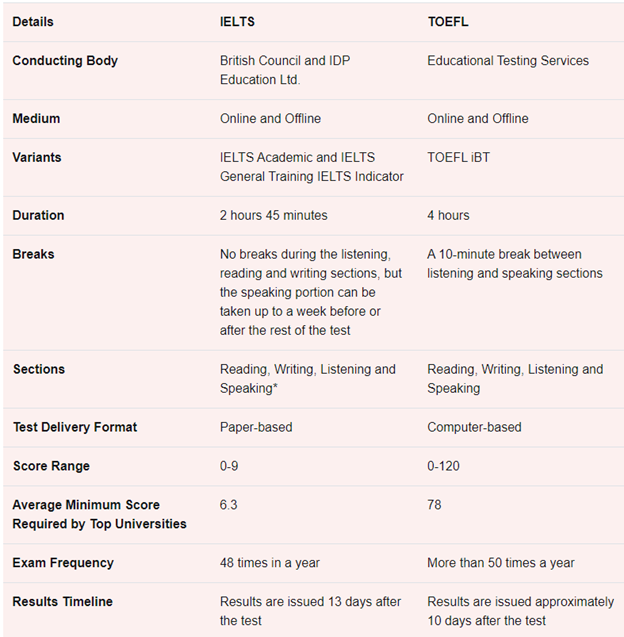IELTS, TOEFL and the Immigration Process
Today, English is the third most commonly spoken language in the world, and it has grown to become the primary language of business, academics, as well as the default language in most areas of research and professional publication. In light of this trend, it is crucial to recognize the importance of English proficiency as a part of the immigration process throughout the English-speaking world, particularly if you plan to work or study abroad. Taking and passing a recognized English test, such as IELTS or TOEFL greatly enhance your work and study prospects in today’s world. It also demonstrates to employers and academic institutions that you are committed to working and living in the country which you are choosing to immigrate to. The International English Language Testing System (IELTS) is a language proficiency test that is taken by candidates who are wishing to attain overseas education or for occupational purposes, while the Test of English as a Foreign Language (TOEFL) is an English language examination which is taken primarily by foreign students who want to study at universities in English-speaking countries like the United States.
Main Differences between IELTS and TOEFL?
The IELTS exam is generally less time consuming than the TOEFL.
The IELTS speaking test is conducted live, in front of an examiner.
The TOEFL normally mandates that you utilize solely US English or UK English throughout the exam and not a combination of the two, while the IELTS is a little more lenient.
The TOEFL is mostly made up of multiple-choice questions, but the IELTS offers a greater variety in how questions are constructed and responses must be delivered.
English speaking countries rely on these tests as part of a set of standards that help them select immigrants from among top applicants, based on their proficiency in English. English proficiency tests are an essential part of university applications to English-speaking countries as well. Non-native speakers of the English language are often required to take these exams in order to complete their university applications. Out of all the possible test options, the popular and most widely-accepted by far are IELTS and TOEFL. Both of them assess the reading, writing, listening, and speaking skills of the candidates but in different formats. Here is a brief table illustrating the key differences.
The IELTS is accepted as evidence of English language proficiency for study, work and migration in Australia, Canada, New Zealand and the UK, while TOEFL scores are accepted by more than 11,000 universities in over 150 countries including US, UK, Canada, Australia, New Zealand, France, and Germany. Between the two exams, TOEFL is more preferred in the US, while IELTS is generally preferred in other countries. IELTS is also accepted by over 3,400 institutions in the USA, including in boarding schools, and university associate, undergraduate, graduate, professional and law programs.
Which industries ask for IELTS?
Many of the registration bodies that accept IELTS represent the health care professions. This includes industries such as nursing, medicine and pharmacy, where English language competence is of critical importance.
Other professional bodies in countries requiring an IELTS result include accounting, engineering, law and veterinary practice.
Additionally, a wide range of other employers from sectors such as finance, government, construction, energy, aviation and tourism also require IELTS.
Each country sets its own IELTS requirements which we will briefly outline below. Scores requirements will also vary depending on the requirements of your visa, and where you plan to study or work, as well as your field and academic credentials and experience.
Australia
IELTS is accepted by the department of Home Affairs for many visa categories, as well as for permanent residency in Australia. It is also a requirement for some Australian professional organizations and accrediting bodies.
The minimum IELTS score for Australian immigration is 6.
Canada
If you are applying for a work visa, professional recognition or for permanent residency in Canada, it is likely that you will be required to present evidence of English language proficiency.
For Canadian immigration, we advise checking with Immigration Refugees and Citizenship Canada for the minimum score as this will differ depending on your individual circumstances.
New Zealand
Immigration New Zealand asks for IELTS as evidence of English language proficiency for many visas. This includes those within the skilled migrant, investor and entrepreneur, residence from work and parent categories.
The minimum IELTS score for New Zealand immigration is 6.5.
UK
Evidence of English language ability is a requirement for those applying to settle permanently in the UK (also known as applying for 'leave to remain' or 'long residence').
IELTS minimum score requirements for migration to the UK vary from 4 to 7.
Comparing the basic format of each test
While the tests are different, they share some commonalities, as this comparison illustrates.
How can I prepare myself for whichever test I choose?
The best way to prepare yourself for one of these tests is to work one-one-one with an instructor who has decades of experience and advanced expertise in this field. We have a highly qualified member of our staff on hand to assist you. We have available an IELTS trainer who holds a PhD in English and Education with a specialization in Language Acquisition, as well as a Master’s degree in Curriculum Design and Instruction. He has taught at multiple universities in the USA and abroad, and he has helped hundreds of students from multiple countries to master these tests. As a part of our assistance, we can also help you with many other English-related tasks related to your goals, including interview preparation for work or study, Curriculum vitae preparation or editing, as well as cover-letter and application letter preparation assistance, and even thesis editing and defense for the most advanced academic programs in the English-speaking universities. You can be confident that, through our wide range of services, we can assist you throughout every step of the complex immigration process.
To get access to expert help today, contact us on info@borderlesscounsel.com!


